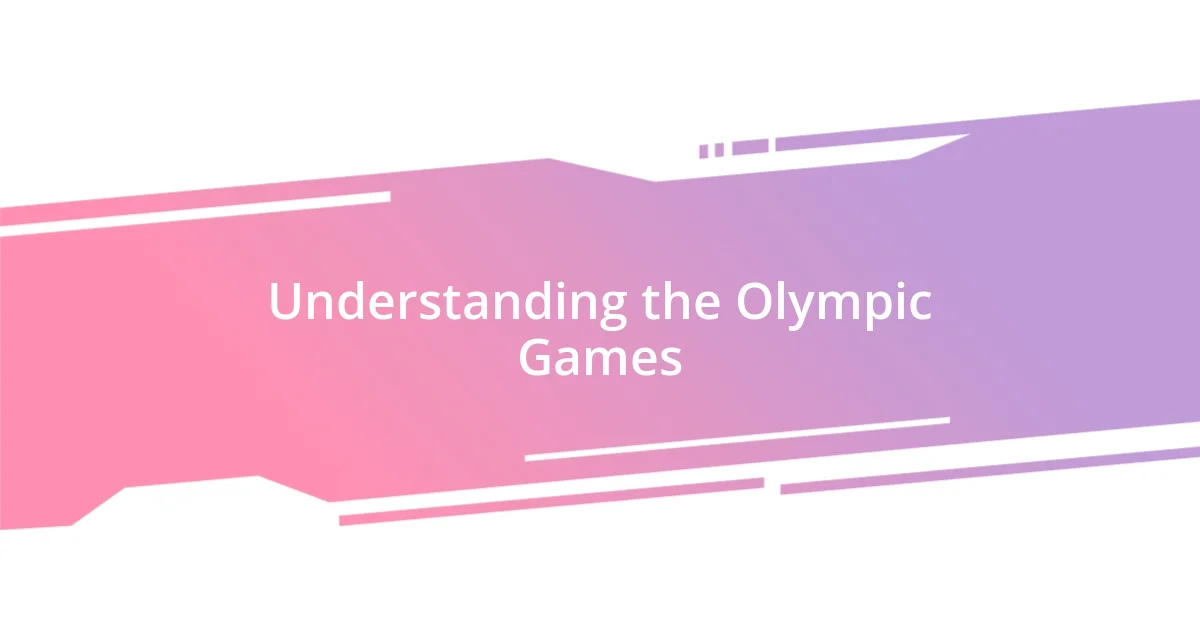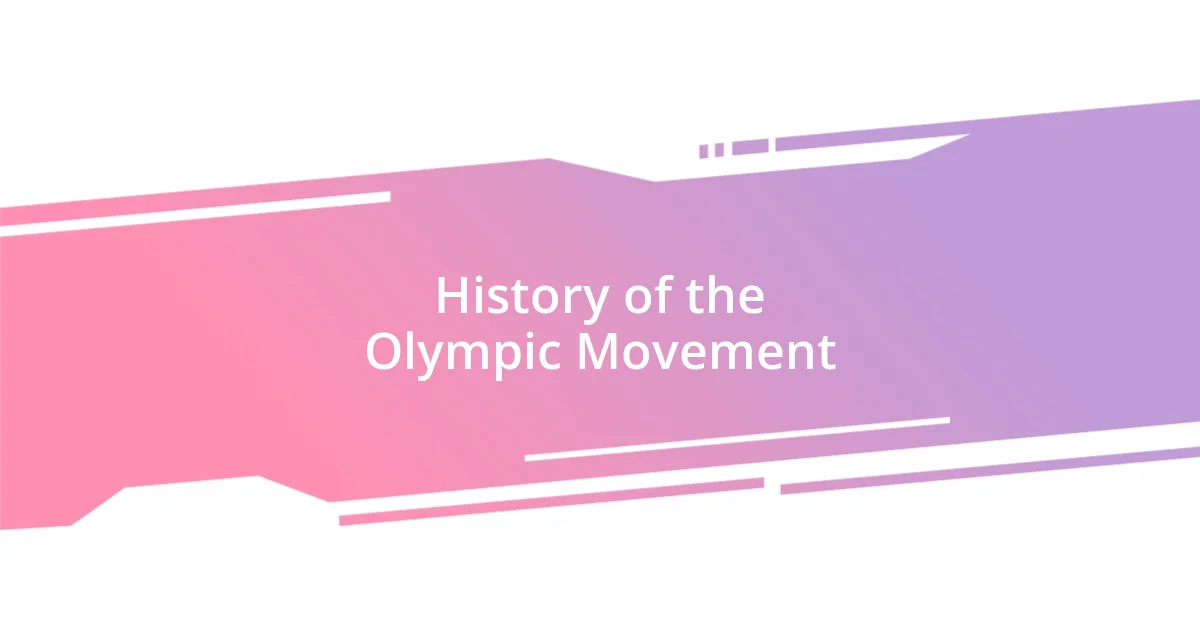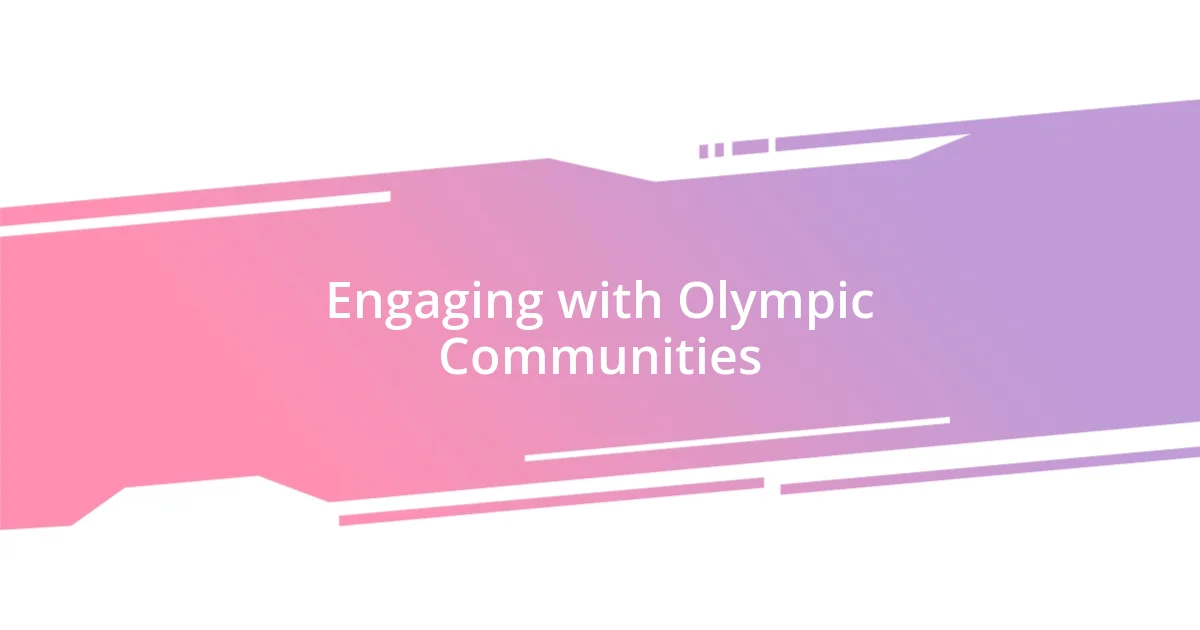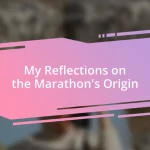Key takeaways:
- The first recorded Olympic Games took place in 776 BC in ancient Greece, celebrating athletic excellence and cultural unity.
- Significant events, such as the Black Power salute in 1968 and the US boycott of the 1980 Moscow Olympics, demonstrate the intersection of sports and social issues.
- Olympic athletes embody resilience and serve as role models, often advocating for social change and inspiring future generations.

Understanding the Olympic Games
The Olympic Games are a monumental celebration of athletic talent and international unity. I still remember the first time I watched the Olympics; the opening ceremony gave me chills. Seeing athletes from all around the world come together, draped in their national flags, made me wonder: what drives these individuals to dedicate their lives to their sport?
As I delved deeper into the history of the Games, I found it fascinating that the very first recorded Olympics took place in ancient Greece in 776 BC. This isn’t just a sporting event; it’s a tradition that spans thousands of years. Have you ever thought about the cultural significance behind the different sports? Each event reflects not only physical prowess but also the unique values and history of the nations represented.
Understanding the Olympic spirit goes beyond the medals and records. I often catch myself reflecting on the incredible journey athletes undertake, facing immense pressure and personal challenges to reach the pinnacle of their sport. It’s all about resilience and passion—qualities we can all appreciate, regardless of our personal interests. Don’t you agree that the real victory lies in the stories of perseverance and triumph behind each athlete?

History of the Olympic Movement
As I explored the origins of the Olympic Movement, I realized that it started in Olympia, a sanctuary for Zeus and a hub of ancient Greek culture. The Games were held every four years, attracting athletes from various city-states, highlighting a spirit of competition that transcended local rivalries. For me, this idea of unifying diverse groups under a common goal resonates deeply; it’s a testament to how sports can bridge divides.
- The original Olympic Games were primarily held in honor of Zeus.
- They featured events like running, wrestling, and chariot racing.
- In 393 AD, Emperor Theodosius banned the Olympics, citing their pagan origins.
- The modern Olympic Movement was revived in 1896 by Pierre de Coubertin.
- The first modern Olympic Games took place in Athens, Greece.
Each of these milestones adds a layer of meaning to the Games. Reflecting on this history, I find it inspiring to think about how these ancient events echo into today’s competitions. Seeing athletes from around the globe, committed and passionate, carries a legacy that enriches the Olympic spirit with every edition.

Key Events in Olympic History
The journey through Olympic history is punctuated by some truly significant events that shaped the Games we know today. One standout moment for me was the 1968 Mexico City Olympics, marked by Tommie Smith and John Carlos’ iconic Black Power salute. This act not only resonated within the realm of sports but also became a powerful statement for civil rights. I can’t help but feel the emotional weight of that moment—how brave they were to use their platform to highlight social injustice, reflecting the intersection of athletics and activism.
Another crucial event was the 1980 Moscow Olympics boycott led by the United States, which was a response to the Soviet invasion of Afghanistan. For me, it raises the question of how politics can intrude upon sports. The disappointment I felt when watching my favorite athletes miss the opportunity to compete was palpable. It made me realize that the Olympics, while a celebration of human achievement, can also be a battlefield for global conflicts and sentiments.
Lastly, I think of the historic 2008 Beijing Olympics, which was not only a display of incredible athletic talent but also a showcase of China’s cultural heritage and its growing influence on the world stage. Watching the elaborate opening ceremony gave me goosebumps, as it seamlessly blended tradition with modernity. It’s a reminder of how the Olympics can serve as a mirror of our times—how athletes can unite nations and how cultures can truly shine through sporting excellence.
| Year | Event |
|---|---|
| 1968 | Black Power salute by Tommie Smith and John Carlos |
| 1980 | US boycott of Moscow Olympics |
| 2008 | Beijing Olympics opening ceremony |

Significance of Olympic Athletes
The significance of Olympic athletes extends beyond their physical prowess; they embody dedication, resilience, and the pursuit of excellence. I still remember watching an athlete compete against all odds; it wasn’t just the victory that moved me, but the story of countless hours of training and sacrifice that led to that moment. Isn’t it inspiring to think how these individuals mirror our own struggles in pursuit of our goals?
Moreover, Olympic athletes serve as role models for their communities and the world. Their journey often resonates with the younger generation, fueling aspirations and dreams. Reflecting on my own experiences, I can pinpoint certain athletes who ignited a passion for sports in me. Their commitment pushed me to achieve more than I thought possible—how powerful is that?
We must also consider the social impact these athletes have. Some use their platform to advocate for change, addressing pressing issues like inequality and mental health. It’s a reminder that the Olympics are not just about competition; they are a stage for dialogue and progress. Reflecting on moments when athletes have spoken out, I find myself questioning the broader implications of their actions. Can their influence go beyond the track or field? I believe it can and it does.

Training for Olympic Competitions
Training for Olympic competitions is a rigorous journey that demands intense dedication and discipline. I remember watching a documentary about a sprinter who recounted waking up at 5 a.m. every day to train, while others were still asleep. It made me think—how far would I go to achieve my goals? The commitment these athletes show is truly jaw-dropping.
One aspect that often gets overlooked is the mental preparation involved. I can’t help but reflect on the psychological challenges elite athletes face, especially during big competitions. I once read about a gymnast who shared her rituals before performing; she visualized every move, and it struck me how powerful the mind can be in achieving physical excellence. It leads me to wonder—how crucial is mindset in defining success? From my perspective, it’s everything.
Of course, the support system around these athletes is paramount. Coaches, family, and even fellow competitors play vital roles in their training. I’ve seen how camaraderie can uplift an athlete during tough times. When you look at Olympic teams training together, you can almost feel the electricity in the air. It’s a beautiful reminder that while individual excellence is celebrated, the spirit of teamwork and support can funnel into extraordinary achievements.

Finding Olympic Knowledge Resources
Finding reliable resources to deepen my understanding of Olympic knowledge can sometimes feel overwhelming, but it’s crucial. Books by former athletes or coaches often provide insider insights that aren’t captured in typical sports media. I recall picking up a biography of an Olympic swimmer, and it opened my eyes to the nuances of training and competition, sparking my curiosity even further. Isn’t it fascinating how personal stories can paint a picture that statistics alone cannot?
Online platforms are another treasure trove for Olympic knowledge. I’ve found that dedicated websites and forums foster vibrant communities where enthusiasts share insights, analysis, and even debates on various Olympic topics. Once, I joined an online discussion about the evolution of Olympic sports, and it was unbelievable how passionate everyone was. Engaging in these conversations made me realize—how often do we miss out on learning just because we didn’t seek out a vibrant community?
Documentaries and films have also played a pivotal role in my quest. Watching an Olympic-themed film once inspired a sudden urge to learn more about the history and struggles behind each sport. Just seeing the sweat, determination, and setbacks of the athletes made me ponder—what sacrifices are made for glory? I believe that visually compelling storytelling can ignite a deeper emotional connection to the Olympics, making the pursuit of knowledge about this grand event all the more rewarding.

Engaging with Olympic Communities
Engaging with Olympic communities has been a transformative experience for me. I remember the first time I attended a local Olympic-themed event; the passion was infectious. Being surrounded by fellow enthusiasts made me realize how much we could learn from each other. It’s incredible how sharing perspectives can deepen our appreciation for the games. Have you ever thought about how much more you could understand just by actively listening and participating in these communities?
Joining social media groups focused on Olympic sports has also opened up a new world for me. I’ll never forget the excitement I felt when I connected with fans from different countries, each sharing their unique takes on the events and athletes. Engaging in lively debates over our favorite moments from past Olympics reminded me of why I fell in love with sports in the first place. It made me wonder: how often do we restrict ourselves to our own views when the world has so much to offer if we only reach out?
Volunteering at local Olympic-oriented events has been particularly rewarding. I vividly recall helping at a youth training camp, where aspiring athletes gathered to learn from experienced coaches. The energy of those young athletes was palpable; their dreams were alive in their eyes. It made me reflect on the importance of nurturing the next generation within the Olympic community. How can we, as knowledgeable fans, contribute to sustaining the spirit of the Olympics? Through direct engagement, we can spark enthusiasm and ensure that the flame of the Olympic spirit burns bright for years to come.














